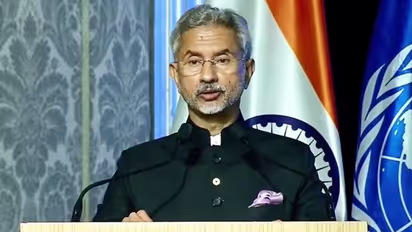26/11 key planners still protected and unpunished: S Jaishankar

Synopsis
"While one of the terrorists was captured alive, prosecuted, and convicted by India's highest court, the key conspirators and planners of the 26/11 attacks continue to be protected and unpunished," said S Jaishankar, EAM.
External Affairs Minister S Jaishankar, on Friday, said that the key conspirators and planners of the 26/11 Mumbai terror attacks are still protected and unpunished.
While talking at a special meeting on 'Countering the Use of New and Emerging Technologies for Terrorist Purposes,' Jaishankar said that the United Nations Security Council (UNSC) has been 'regrettably' unable to act in some cases when it comes to restricting some terrorists due to "political considerations."
"The key conspirators and planners of the 26/11 terror attacks remain safe and unpunished," he said. This, according to Jaishankar, undermines the collective credibility and interest.
Jaishankar and Gabonese Foreign Minister and UN Security Council President Michael Moussa paid tribute to the victims of the 26/11 terror attack at the Taj Mahal Palace hotel. According to Jaishakar, the 'shocking' terror attack targeted Mumbai and the international community.
Regarding terror financing, Jaishankar said that one of the most important aspects of combating terrorism is effectively limiting funding, as money is the lifeblood of terrorism. The fact that terrorism continues to exist and expands indicates an underlying truth that terrorism is receiving the necessary financial resources.
Jaishankar raised five points for the UN committees to consider. He mentioned FATF, which recently removed Pakistan from the grey list, without naming Pakistan. The points are, (a) Effective and sustained efforts must be made to combat terror financing; the UN's normative efforts must collaborate with other fora, such as the FATF, (b) To ensure that the Security Council's sanctions regime does not become ineffective due to political considerations, (c) International cooperation and coordinated action against terrorists and their sponsors, including destroying terrorist safe havens, are critical imperatives, (d) The link between terrorism and transnational organised crime, such as arms and illicit drug trafficking, is now well established. It is critical to recognise that, (e) Terrorist organisations have broadened their funding sources. Innovative solutions are required to counter the challenges posed by the new technology exploited by terrorism.
According to the foreign minister, 14 years ago, Mumbai was the site of one of the most shocking terror attacks in modern history. In four days, 140 Indian nationals and 26 citizens from 23 other countries were killed. Terrorists from the other side of the border held the entire city hostage.
Jaishankar said, "The city of Mumbai was held hostage, and the victims included ordinary Mumbaikars going about their daily lives." Before being murdered, nationals of specific countries were identified, and as a result, the commitment of every United Nations member state to combat terrorism was publicly challenged, according to Jaishankar. "We have worked hard to bring the masterminds and perpetrators of this attack to justice. This task is still unfinished. The gathering of the UN Security Council's counter-terrorism committee at this location is special and significant," Jaishankar continued.
The Taj Mahal Palace hotel in India has been chosen to host the anti-terrorism meeting, which will be attended by Ghana's Foreign Minister, Shirley Ayorkor Botchwey; Gabon's Foreign Minister, Michael Moussa-Adamo; UAE's Minister of State, Reem Bint Ebrahim Al Hashimy; the UK's Foreign Secretary, James Cleverly; Albania's Deputy Foreign Minister, Megi Fino; and UN Deputy Secretary-General Vladimir Voronkov This is also the first high-level visit from the United Kingdom since Prime Minister Rishi Sunak took office.
Also Read: Foreign Minister S Jaishankar to travel Moscow on November 8
Also Read: Freedom being misused: EAM Jaishankar opens up on anti-India activities in Canada
Stay updated with the Breaking News Today and Latest News from across India and around the world. Get real-time updates, in-depth analysis, and comprehensive coverage of India News, World News, Indian Defence News, Kerala News, and Karnataka News. From politics to current affairs, follow every major story as it unfolds. Get real-time updates from IMD on major cities weather forecasts, including Rain alerts, Cyclone warnings, and temperature trends. Download the Asianet News Official App from the Android Play Store and iPhone App Store for accurate and timely news updates anytime, anywhere.